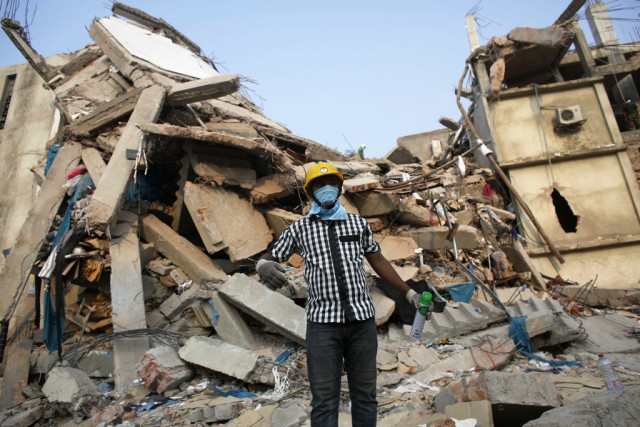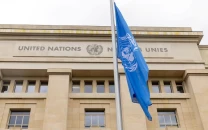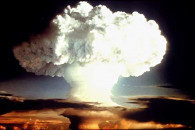Bangladesh's collapsed building death toll passes 1,000
Western firms criticise factories for not ensuring worker safety.

A rescue worker stands in front of the rubble of the collapsed Rana Plaza building, in Savar, 30 km (19 miles) outside Dhaka April 26, 2013. PHOTO: REUTERS
Army spokesman Captain Shahnewaz Zakaria told AFP that the "death toll now stands at 1,006" as the recovery operation entered its 17th day since the building caved in at Savar town, 30 kilometres southwest of Dhaka.
Zakaria said recovery workers armed with "cranes, bulldozers and excavators" had pulled out 130 bodies from the rubble since 6am Thursday as more bodies were found in the pancaked lower floors.
Some of the bodies, which are badly decomposed, could be identified by mobile phones in their pockets or factory identity cards around their neck, he said. "Of the total dead, most are female garment workers."
Of the bodies recovered so far, "at least 150 bodies were buried in unmarked graves in a state graveyard after they could not be identified," Zakaria added.
The authorities are taking DNA samples from all the victims for future compensation claims.
More than 3,000 garment workers were in the building's five garment factories which made clothing for Western retailers such as Benetton, Mango and Primark when the structure collapsed after a loud bang, trapping them.
At least 2,437 people have been rescued, around 1,000 suffering serious injuries, including scores whose limbs had to be cut off to free them from the rubble.
Efforts to identify the victims are being hampered by the decomposition of bodies. Recovery workers, who are drawn from the ranks of the army and fire service, are having to wear masks and use air freshener.
Preliminary findings of a government probe have blamed vibrations by four giant generators on the compound's upper floors for triggering the collapse.
The building's architect told AFP he designed the structure to house a shopping mall and offices, not factories.
Police have arrested twelve people including the plaza's owner and four garment factory owners for forcing people to work on April 24, even though cracks appeared in the structure the previous day.
Factory workers have held protests calling for tough punishment for those responsible for the disaster, and demanding improved safety regulations.
The April 24 collapse was the latest in a string of deadly accidents to hit the textile industry. A factory fire last November killed 111 garment workers.
On Thursday, disaster struck again as a fire in another garment factory in the Bangladeshi capital killed eight people including its owner.
The cause of the fire was not known, but authorities said it broke out during the night on the third floor of an 11-storey building housing garment factories of the Tung Hai group in Dhaka's Darussalam district.
Fire is a common problem in the 4,500 garment factories in Bangladesh, with many operations based in badly constructed buildings with sub-standard wiring.
Around 700 people have been killed in garment factory fires in the country since 2006, according to the Amsterdam-based Clean Clothes Campaign group.
Bangladesh is the world's second-largest apparel maker and the $20 billion industry accounted for up to 80 percent of annual exports last year.
But it has a shocking safety record and Western retailers have been threatening to pull out unless authorities come up with a credible programme to raise standards. Disney has already done so.
Western firms have criticised the factories for not ensuring worker safety, but major brands continue to place orders and critics say they turn a blind eye to the endemic problems.
The government Wednesday announced the closure of 18 garment plants, days after it promised to give "the highest consideration" to safety after talks with the International Labour Organisation.



















COMMENTS
Comments are moderated and generally will be posted if they are on-topic and not abusive.
For more information, please see our Comments FAQ